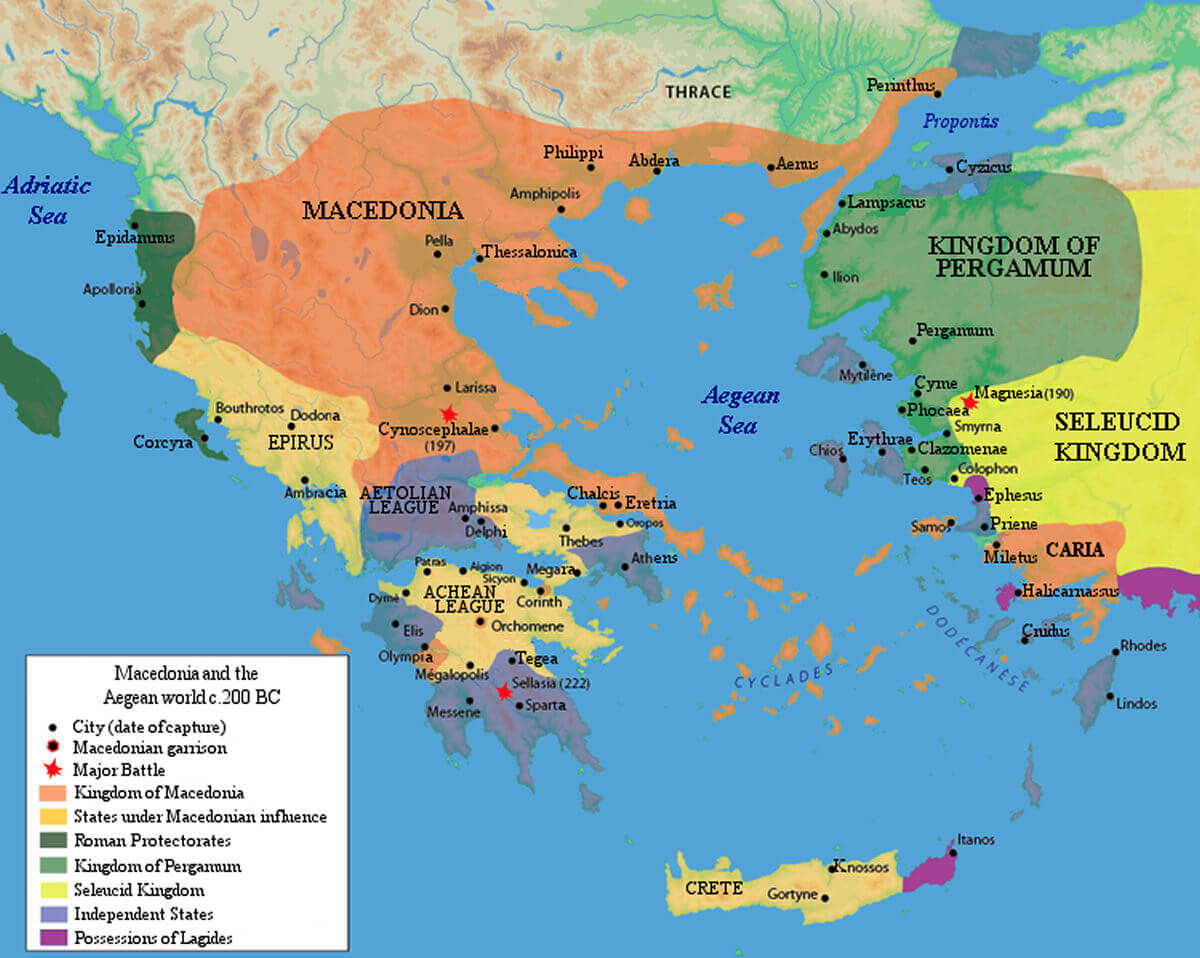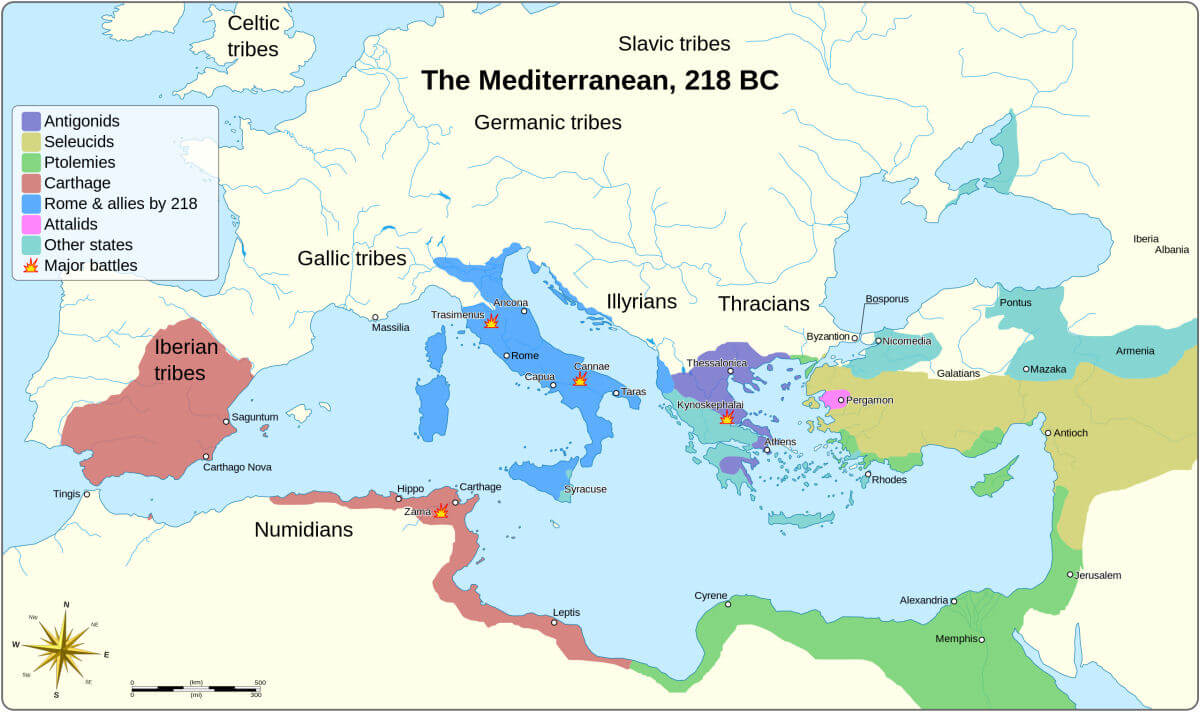As Hannibal ravaged Italy in the Second Punic War, Philip V of Macedonia sought to take advantage of Rome's problems and extend his domain within his region of influence.
After Hannibal destroyed the Romans at Cannae in 216 BC, the opportunity was perfect for an alliance between Philip and Hannibal. Heavily influenced by Demetrius of Illyria, who had been expelled by the Romans just a few years earlier, Philip looked to both the north and south to expand his kingdom.

Macedonia and the Aegean region c. 200 BC
In 214 BC, Philip moved a small fleet to Illyria to begin feeling out his chances there. The Romans, with little resources to spare for another major campaign, sent the Praetor Marcus Valerius Laevinus with a fleet of 50 ships to watch over Philip from Apulia on the Adriatic. As Philip campaigned in Illyria, Laevinus crossed over to protect Roman interests, and Philip was forced to burn his small fleet to prevent its capture.
Philip, however, was not to be so easily defeated. Well aware of Hannibal's victories in Italy, he knew that Laevinus could only defend by sea, and so the land route to Illyria was wide open. Marching north, the Macedonians captured several cities, while all Laevinus could do was prevent any attempted reinforcement of Hannibal's Carthaginian army and harrass coastal bases and supply routes.
The Roman Senate had no choice but to seek land allies within reach of Philip to counteract Macedonia. In 211 BC, the Romans approached the Aetolian League of West Central Greece - old enemies of Philip - to form an alliance. A deal was struck easily, granting the Aetolians any land they could capture simply in exchange for keeping Philip occupied.
Initially, the Aetolians were successful... at least, successful enough in the Roman view to accomplish the objective of keeping a buffer between Philip and Italy. In 209 BC, the small alliance was joined by Attalus of Pergamum on the Asia Minor coast, but nothing of any major consequence came of this arrangement other than, again, helping to keep Philip at bay.
By this time, Publius Sulpicius Galba had taken command of the Adriatic fleet. His primary goal was to maintain the status quo while Rome dealt with Carthage.
An uneventful campaign year later, Attalus withdrew back to Pergamum with little gain or loss in the affair. By 208 BC, now free on his eastern flank, Philip invaded the Aetolians without their ally and little available assistance from Rome, forcing Aetolia to sue for peace.
Despite Galba's objections, the Aetolians were outmatched, and by 206 BC were ready to accept Macedonian terms. Philip continued to have his way on the eastern shore of the Adriatic for another couple of years as the Romans waited out Hannibal back in Italy.
By 205 BC, Scipio's invasion of Africa forced the withdrawal of Hannibal back to Carthage, and Rome was able to finally deal with Philip. Tired of the long and terribly costly Second Punic War, however, the Romans did little more than assemble an army.
11,000 legionaries were assembled from Punic War veterans and prepared to meet the Macedonians but, by this time, both sides were ready for peace. Philip was happy with his gains and was willing to negotiate peace if the terms were favorable, thereby avoiding direct confrontation with Rome's veterans.
Near the end of 205 BC, Scipio Africanus treated a peace arrangement with Philip that allowed him to keep almost everything he had gained. The interior regions of Illyria (previously only of nominal interest for Rome) was ceded willingly to Macedonia, and access to the Adriatic Sea was also granted. Greek cities on the western coast of the Achaean peninsula, however, had to remain free of Macedonian authority, and with this Philip willingly agreed.
With little cost or effort in the so-called "war", the Romans gave up very little of their own properties or territories, and achieved their goal of keeping Philip from helping Hannibal. Because of its treaty arrangement working to the benefit of the Greek city-states, Roman influence in the cultural center of the world deepened and became more profound.
The close relations between Rome and Greece, along with continued resentment between Rome and Macedonia, would lead to a series of several wars between the two nations.

Goran tek-en, CC BY-SA 4.0, via Wikimedia Commons
The Mediterranean region in 218 BC
Punic Wars and Expansion - Table of Contents
- First Punic War
- Illyrian Wars
- Conquest of Cisalpine Gaul
- Second Punic War
- First Macedonian War
- Second Macedonian War
- Syrian War
- Third Macedonian War
- Fourth Macedonian War and the Achaean War
- Third Punic War
Did you know...
At its height, the Aetolian League stretched across Greece from coast to coast.



